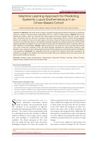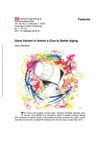 3 citations,
June 2017 in “Methods”
3 citations,
June 2017 in “Methods” Researchers created a model to understand heart aging, highlighting the role of microRNAs and identifying key genes and pathways involved.
 1 citations,
December 2016
1 citations,
December 2016 Researchers created a model to understand heart aging, highlighting key genes and pathways, and suggesting miR-208a as a potential heart attack biomarker.
[object Object]  42 citations,
December 2016 in “Cell Death & Differentiation”
42 citations,
December 2016 in “Cell Death & Differentiation” Damaging mitochondrial DNA in mice speeds up aging due to increased reactive oxygen species, not through the p53/p21 pathway.
 16 citations,
November 2013 in “European Journal of Dermatology”
16 citations,
November 2013 in “European Journal of Dermatology” Hair gets thinner and grayer with age, and density decreases more in men on top and in women on top and back.
 12 citations,
October 2004 in “Experimental Gerontology”
12 citations,
October 2004 in “Experimental Gerontology” Changes in testosterone and estrogen receptor genes can affect how men age, influencing body fat, hair patterns, and possibly leading to skin disorders.
 5 citations,
May 2023 in “Frontiers in immunology”
5 citations,
May 2023 in “Frontiers in immunology” Environmental factors like diet and vitamin levels, especially Vitamin D, can affect autoimmune diseases differently, with lifestyle changes potentially improving outcomes.
 1 citations,
December 2022 in “Sultan Qaboos University medical journal”
1 citations,
December 2022 in “Sultan Qaboos University medical journal” The machine learning model accurately predicts Systemic Lupus Erythematosus in Omani patients.
 1 citations,
June 2021 in “Journal of dermatology and dermatitis”
1 citations,
June 2021 in “Journal of dermatology and dermatitis” Tyrosine kinase inhibitors show promise in treating some skin diseases but their definitive role in dermatology is still unclear.
 1 citations,
April 2021 in “Current Stem Cell Reports”
1 citations,
April 2021 in “Current Stem Cell Reports” Eating less can improve stem cell function and increase lifespan.
 January 2018 in “Genetic engineering & biotechnology news”
January 2018 in “Genetic engineering & biotechnology news” A genetic mutation linked to longer life and less disease was found in the Amish, and a drug is being developed to replicate these benefits.
 75 citations,
November 2016 in “Medicines”
75 citations,
November 2016 in “Medicines” Beta-sitosterol has potential health benefits but needs more research to fully understand its effects and improve its use in treatments.
 70 citations,
March 2008 in “Mechanisms of Ageing and Development”
70 citations,
March 2008 in “Mechanisms of Ageing and Development” Maintaining DNA health in stem cells is key to preventing aging and tissue breakdown.
 18 citations,
November 2016 in “Neuromuscular Disorders”
18 citations,
November 2016 in “Neuromuscular Disorders” Patients with myotonic dystrophy often have skin problems that suggest early aging and vitamin D issues, and the severity of these problems is linked to their genetic condition and vitamin D levels.
 7 citations,
January 2015 in “Current problems in dermatology”
7 citations,
January 2015 in “Current problems in dermatology” Hair loss can be caused by stress, infections, drugs, and various diseases, with treatment depending on accurate diagnosis.
 January 2012 in “Else Kröner-Fresenius Symposia”
January 2012 in “Else Kröner-Fresenius Symposia” Maintaining DNA integrity in stem cells is crucial to prevent aging and cancer.
 30 citations,
April 2021 in “The Journal of Sexual Medicine”
30 citations,
April 2021 in “The Journal of Sexual Medicine” Testosterone therapy can help postmenopausal women with low sexual desire if monitored carefully.
 4 citations,
October 2022 in “Frontiers in public health”
4 citations,
October 2022 in “Frontiers in public health” Cadmium chloride pollution can cause skin disorders, speed up aging, and prevent hair growth.
 2 citations,
January 2023 in “Journal of Dermatology”
2 citations,
January 2023 in “Journal of Dermatology” Some types of hair loss can continue for a long time after recovering from a severe drug reaction known as DRESS.
 105 citations,
January 2010 in “Mediators of Inflammation”
105 citations,
January 2010 in “Mediators of Inflammation” Skin surface lipids are important for skin health and altering them could help prevent aging and treat skin conditions.
 144 citations,
September 2012 in “Genes & development”
144 citations,
September 2012 in “Genes & development” Aging causes skin stem cells to work less effectively.
 143 citations,
September 2008 in “Experimental gerontology”
143 citations,
September 2008 in “Experimental gerontology” Skin aging is due to impaired stem cell mobilization or fewer responsive stem cells.
122 citations,
April 2020 in “American Journal Of Pathology” Skin aging is a complex process influenced by various factors, leading to wrinkles and sagging, and should be considered a disease due to its health impacts.
 77 citations,
July 2020 in “Journal of the European Academy of Dermatology and Venereology”
77 citations,
July 2020 in “Journal of the European Academy of Dermatology and Venereology” Environmental factors, hormones, nutrition, and stress all significantly affect skin health and aging.
 77 citations,
March 2014 in “Cold Spring Harbor Perspectives in Medicine”
77 citations,
March 2014 in “Cold Spring Harbor Perspectives in Medicine” Fat cells are important for healthy skin, hair growth, and healing, and changes in these cells can affect skin conditions and aging.
 33 citations,
January 2018 in “The International Journal of Developmental Biology”
33 citations,
January 2018 in “The International Journal of Developmental Biology” Cell aging can be both good and bad for tissue repair.
[object Object]  33 citations,
April 2005 in “British Journal of Dermatology”
33 citations,
April 2005 in “British Journal of Dermatology” Aging alone barely affects the number of hair follicles, meaning hair loss is minimal without other conditions like androgenetic alopecia.
29 citations,
October 2019 in “Journal of dermatological science” Studying premature aging syndromes helps understand human aging and suggests potential treatments.
 22 citations,
January 2015 in “Actas dermo-sifiliográficas/Actas dermo-sifiliográficas”
22 citations,
January 2015 in “Actas dermo-sifiliográficas/Actas dermo-sifiliográficas” Platelet-rich plasma might help with skin aging, ulcers, and hair loss, but more research is needed to prove its effectiveness and safety.
 20 citations,
April 2021 in “Journal of Womens Health”
20 citations,
April 2021 in “Journal of Womens Health” Testosterone can help premenopausal and postmenopausal women with low sexual desire, but its long-term safety is unclear and it's not widely approved for this use.
 18 citations,
August 2019 in “Nutrients”
18 citations,
August 2019 in “Nutrients” Eating barley for life may lead to healthier aging in mice.




























